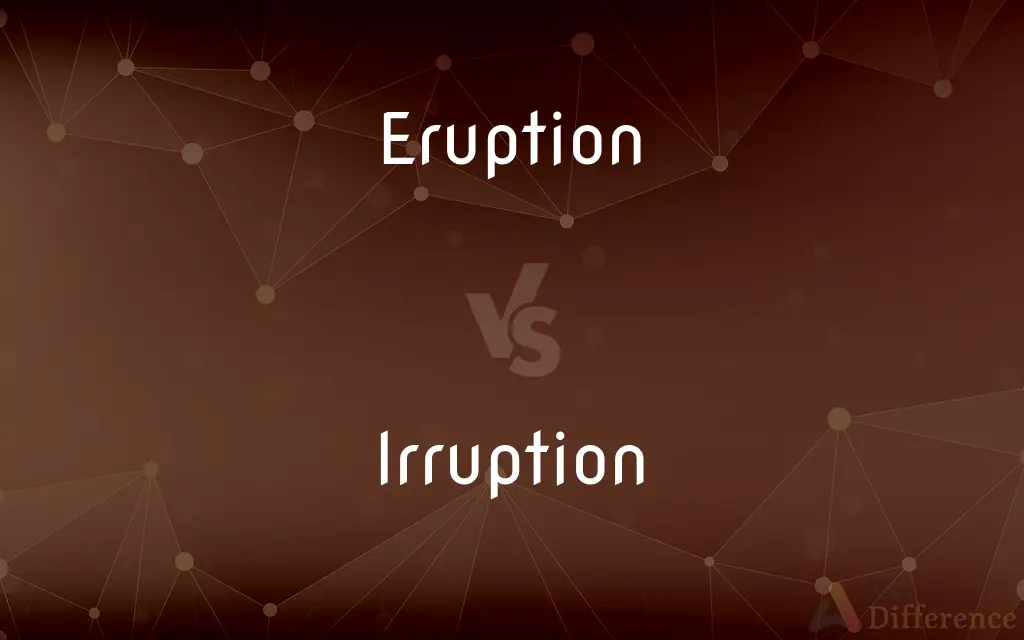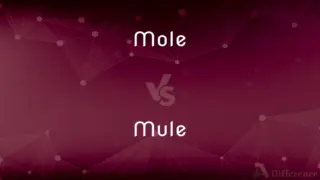Eruption vs. Irruption — What's the Difference?
By Tayyaba Rehman & Maham Liaqat — Updated on April 9, 2024
Eruption describes a sudden outbreak, often volcanic or skin-related, while irruption denotes a sudden increase, typically of animals into new territories.

Difference Between Eruption and Irruption
Table of Contents
ADVERTISEMENT
Key Differences
Eruptions are characterized by the explosive release of energy or substances, such as when a volcano expels lava, ash, and gases into the atmosphere. This process is often preceded by seismic activity and can have profound environmental and climatic effects. On the other hand, irruption refers to a sudden surge in the population density of a species in a particular area, often due to changes in food availability, habitat conditions, or other ecological factors. This term is commonly used in ecology and ornithology to describe unexpected migrations or population increases of birds and animals.
While eruptions can be destructive, dramatically altering landscapes and affecting global weather patterns, they also play a key role in shaping the Earth's surface and can create new landforms. Irruptions, however, mainly impact local ecosystems and species dynamics, sometimes leading to overgrazing, spread of diseases, or conflicts with human activities. Both phenomena, while drastically different in nature and scale, highlight the dynamic and interconnected aspects of natural processes.
Eruptions, such as those from volcanoes, are studied in the field of volcanology, which examines the formation, distribution, and activity of volcanoes. Scientists monitor volcanic activity to predict eruptions and mitigate their impacts on human populations and infrastructure. Conversely, irruptions are of interest to ecologists and conservationists, who study these events to understand their causes, effects on ecosystems, and implications for biodiversity conservation.
In human health, eruption also refers to the sudden appearance of lesions or rashes on the skin, indicative of diseases, allergic reactions, or other conditions. This contrasts with irruption, which does not have a direct application in medical contexts but rather remains relevant to discussions about wildlife management and conservation strategies.
Despite their differences, both eruption and irruption underscore the importance of monitoring and understanding natural and biological phenomena to predict their occurrences and manage their effects on the environment and human societies.
ADVERTISEMENT
Comparison Chart
Definition
The sudden expulsion of material, such as lava from a volcano.
A sudden increase in the number of animals in a particular area.
Context
Geology, dermatology.
Ecology, ornithology.
Causes
Volcanic activity, skin conditions.
Changes in habitat, food availability.
Effects
Changes in landscape, climate effects.
Changes in ecosystem dynamics.
Study Field
Volcanology, dermatology.
Ecology, conservation biology.
Compare with Definitions
Eruption
Release of Energy.
The eruption of joy from the crowd was overwhelming when the team won.
Irruption
Ecological Phenomenon.
The irruption of certain fish species has altered the lake's ecosystem.
Eruption
Skin Eruption.
The patient's skin eruption was diagnosed as chickenpox.
Irruption
Bursting In.
The irruption of protesters into the building caused a security scare.
Eruption
Volcanic Eruption.
The 1980 eruption of Mount St. Helens significantly altered the surrounding landscape.
Irruption
Sudden Entry.
The irruption of invasive species into new habitats threatens native wildlife.
Eruption
Sudden Outbreak.
The sudden eruption of violence in the city prompted a curfew.
Irruption
Rapid Spread.
The irruption of the disease was facilitated by poor sanitary conditions.
Eruption
Emission of Substance.
The eruption of gases from the factory was visible from miles away.
Irruption
Animal Population Increase.
The irruption of snowy owls into southern regions was unexpected.
Eruption
The act or process of erupting.
Irruption
To break or burst in
The boys irrupted into the kitchen.
Eruption
An instance of erupting.
Irruption
(Ecology) To increase rapidly in number, especially beyond the normal range
Snowy owls that irrupted southward.
Eruption
A sudden, often violent outburst.
Irruption
The action of irrupting or breaking into; a violent entry or invasion; an inbreaking; an intrusion.
The Trojan irruption into the Greek camp is related in Book XV of the Iliad.
Eruption
An appearance of a rash or blemish on the skin.
Irruption
(ecology) An abrupt increase of an animal population.
Extreme rainfall events predict irruptions of rat plagues in central Australia.
Eruption
Such a rash or blemish.
Irruption
(by extension) An abrupt increase in the size of a movement or organization.
How can we explain this irruption of young people self-identifying as socialists?
Eruption
The emergence of a tooth through the gums.
Irruption
A bursting in; a sudden, violent rushing into a place; as, irruptions of the sea.
Lest evil tidings, with too rude irruptionHitting thy aged ear, should pierce too deep.
Eruption
A violent ejection, such as the spurting out of lava from a volcano.
A volcanic eruption
Irruption
A sudden and violent inroad, or entrance of invaders; as, the irruptions of the Goths into Italy.
Eruption
A sudden release of pressure or tension.
There was an eruption of joy at the final whistle.
Irruption
A sudden violent entrance; a bursting in;
The recent irruption of bad manners
Eruption
An infection of the skin resulting in a rash or blemishing.
Irruption
A sudden sharp increase in the relative numbers of a population
Eruption
The act of breaking out or bursting forth;
All Paris was quiet . . . to gather fresh strength for the next day's eruption.
Irruption
A sudden violent spontaneous occurrence (usually of some undesirable condition);
The outbreak of hostilities
Eruption
That which bursts forth.
Eruption
A violent exclamation; ejaculation.
He would . . . break out into bitter and passionate eruditions.
Eruption
The breaking out of pimples, or an efflorescence, as in measles, scarlatina, etc.
Eruption
The sudden occurrence of a violent discharge of steam and volcanic material
Eruption
Symptom consisting of a breaking out and becoming visible
Eruption
(of volcanos) pouring out fumes or lava (or a deposit so formed)
Eruption
A sudden violent spontaneous occurrence (usually of some undesirable condition);
The outbreak of hostilities
Eruption
A sudden very loud noise
Eruption
The emergence of a tooth as it breaks through the gum
Common Curiosities
Can human activities cause eruptions?
Human activities cannot cause volcanic eruptions, but skin eruptions can be triggered by allergies, infections, or environmental factors.
What are the consequences of a volcanic eruption?
Consequences include loss of life, property damage, air travel disruption, and climate effects due to ash and gas emissions.
How do scientists predict eruptions?
Scientists use seismic activity, changes in gas emissions, and ground deformation to predict volcanic eruptions.
Can irruptions lead to new species discoveries?
Yes, irruptions can lead to the discovery of species previously unknown in certain areas.
What triggers an irruption in animal populations?
Changes in food availability, habitat conditions, or climatic factors can trigger an irruption.
What causes a volcanic eruption?
Volcanic eruptions occur due to the movement of tectonic plates, resulting in the release of magma, gas, and ash.
Are all eruptions harmful?
Not all skin eruptions are harmful; some may be benign or self-limiting, while volcanic eruptions can have both destructive and fertile effects on the environment.
Are irruptions beneficial or harmful to ecosystems?
Irruptions can be both; they may provide a temporary abundance of food for predators but also lead to overgrazing and habitat degradation.
Can eruptions lead to new landforms?
Yes, volcanic eruptions can create islands, mountains, and other landforms.
How do irruptions affect human activities?
They can impact agriculture, spread diseases, and lead to conflicts over natural resources.
How are irruptions monitored?
Through wildlife tracking, population surveys, and satellite imagery.
What is the difference between an eruption and an explosion?
An eruption refers specifically to volcanic activity or skin lesions, while an explosion is a sudden, violent release of energy.
How do irruptions contribute to biodiversity?
Irruptions can increase biodiversity by introducing species to new habitats, but they can also threaten it by disrupting existing ecosystems.
What role do eruptions play in Earth's geology?
Eruptions help shape the Earth's surface, creating new landforms and contributing to the rock cycle.
What is the main difference between eruption and irruption?
The main difference lies in their contexts: eruptions relate to the sudden release of substances or energy, while irruptions refer to sudden increases in animal populations.
Share Your Discovery

Previous Comparison
Mole vs. Mule
Next Comparison
Title vs. PrefixAuthor Spotlight
Written by
Tayyaba RehmanTayyaba Rehman is a distinguished writer, currently serving as a primary contributor to askdifference.com. As a researcher in semantics and etymology, Tayyaba's passion for the complexity of languages and their distinctions has found a perfect home on the platform. Tayyaba delves into the intricacies of language, distinguishing between commonly confused words and phrases, thereby providing clarity for readers worldwide.
Co-written by
Maham Liaqat













































